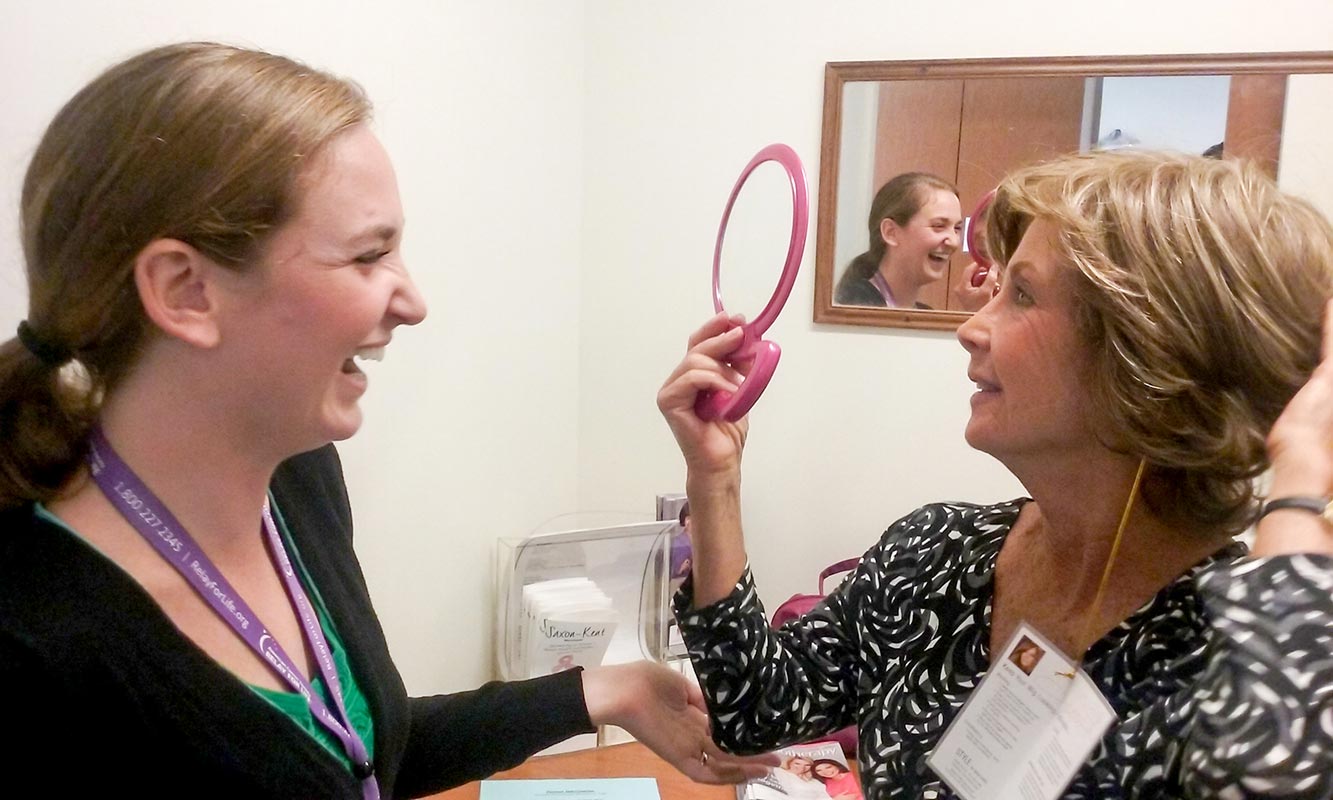When the harrowing diagnosis of cancer comes, patients at UConn Health’s Carole and Ray Neag Comprehensive Cancer Center have one additional ally to go with their care team.
Amber Tillinghast is there, embedded right in the cancer center on the fourth floor of the Outpatient Pavilion, to help connect patients with programs and services and try to take at least some of the fear and uncertainty out of what lies ahead.
Tillinghast has been UConn Health’s American Cancer Society patient navigator for about five months. In this role she helps patients find their way to resources like transportation services, resources for wigs and other cosmetic products, community programs, social worker services, support groups, and all applicable American Cancer Society programs.
One of the more popular offerings is “Look Good… Feel Better,” which provides patients with free cosmetic products and expertise from a certified cosmetologist.

“While they’re going through treatment, a lot of them are not feeling well and they’re not taking a lot of time to necessarily focus on their outward appearance, so this is just a good time for them to focus on themselves,” Tillinghast says. “It’s amazing to see how when they’re first in the session they’re nervous, they’re with a group of people that they don’t know, and by the end of the session they have makeup on, they feel great, they’re chatting and laughing with each other. It’s really amazing to watch how they come in and how they leave.”
Defeating cancer became a personal crusade for Tillinghast at a young age. As a child growing up in Southbury, she learned her maternal grandmother was a cervical cancer survivor, and in her teens she watched her paternal grandfather battle lung cancer.
“My grandfather was kind of the glue of our whole family,” Tillinghast says. “My entire family, every weekend, would go and visit him. It was really hard to see everybody crumble as he was sick.”
Tillinghast recalls accompanying her grandfather on some of his appointments.
“I knew that I wanted to somehow get involved and fight back against this disease,” Tillinghast says. “His wish was that I become a nurse, because he loved his nurses so much.”
While nursing wasn’t for her, it didn’t take long for her to find her calling. Before she started high school, Tillinghast was volunteering for the American Cancer Society.
“I mostly participated in their Relay for Life events through middle school and high school, and I was a chair of Relay in college,” Tillinghast says.
Within months of graduating from Endicott College in Beverley, Massachusetts, Tillinghast started working for the American Cancer Society in Warwick, Rhode Island, as a Relay for Life specialist. After three years managing five different Relay events, she moved back to Connecticut as a volunteer coordinator for VITAS Healthcare in Stratford, a hospice organization.
“That really helped me more understand the medical side of things, working with doctors, nurses, and social workers,” Tillinghast says.
From there she returned to the American Cancer Society, in her current role at UConn Health, where she, nurse navigator Wendy Thibodeau, and breast nurse navigator Molly Tsipouras work together to offer patients medical and emotional support.
The navigators also provide patients with a Personal Health Manager, an organizational toolkit prepared by the American Cancer Society that helps patients keep together all the information relevant to their care, such as appointments, a place to write down questions, and information about their providers, treatment centers and medications.
Tillinghast also had a hand in the development of a dedicated space in the Neag Comprehensive Cancer Center for caregivers. This “caregiver lounge” will offer brochures and other resources that help caregivers find the support they need, whether it be at UConn Health, through the American Cancer Society, or in the community.
“We will be holding monthly sessions as well that will be targeted toward caregivers,” Tillinghast says. “Our first one in November will be on nutrition and how to eat and prepare healthy snacks in their hectic lives.”
Additionally, Tillinghast is working with UConn Health staff to increase the visibility of the different cancer awareness months. In October, for Breast Cancer Awareness Month, they distributed pink ribbon pins to staff and patients and placed pop-up information tables around the cancer center with information on early detection.



